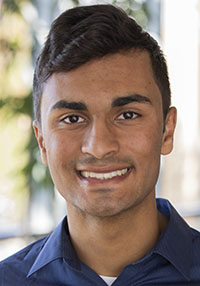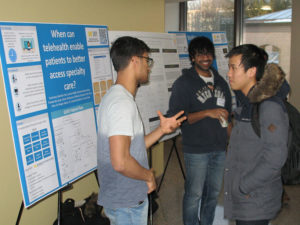
My name is Nick and I am an incoming junior studying Industrial and Operations Engineering (IOE). During my time at CHEPS, I have worked on a variety of projects ranging from simulation, provider scheduling, and data analytics. Being part of the CHEPS family has been the most meaningful experience I have had at Michigan–academically, professionally, and socially.
I started working at CHEPS the summer after my first year. I had recently transferred to the College of Engineering and was very nervous about my future at Michigan. Early in my freshman year, I lost interest in Biochemistry (my original major) and decided to take the engineering prerequisites in case I wanted to transfer. These courses lived up to their reputation and I found them extremely challenging, especially Math 116.
I started at CHEPS with limited programming experience and no formal training in IOE principles. However, instead of being given all the “dirty work,” I instead received encouragement and support from the staff and senior students. During my first summer, I learned more than I have in any class or other experience. Not only was I introduced to most of the IOE topics I’d learned about throughout the last year, but I also substantially improved my programming skills to the point where I am now considering a computer science minor. I attribute a lot of my success during the last year to my time at CHEPS.

During the sophomore year of IOE, a lot of new technical skills are brought to the table. For many students, it is easy to get lost in the technicalities of the coursework, and not see the bigger picture. CHEPS served as the perfect accompaniment to these classes due to its direct applicability. Thanks to CHEPS, I am more confident academically and professionally. For example, working on provider scheduling projects at CHEPS made IOE 310, known as the hardest IOE course, a lot more enjoyable as I had seen real-world applications of many of the topics covered in that course.
I could not write a CHEPS blog without mentioning the community aspect of CHEPS. It’s been very special to become good friends with so many people whom I would have otherwise not met. CHEPS has cultivated a community where I feel that I can always ask for help or simply just find someone to talk to about anything. Whether it’s formulating an optimization model, competing in the NY Times Daily Mini crossword, or a CHEPS Thursday, every experience of mine at CHEPS has been fantastic. I look forward to coming back for CHEPS reunions in years to come.
More than anything, I believe CHEPS has given me a “lens” through which to view the world. The practical application of IOE principles done day-to-day at CHEPS has become part of my DNA. Every time I go to the airport, I cannot help but think about the optimization of the flight network and other operational activities. Although my work at CHEPS has been focused on healthcare, I can easily draw parallels from these projects to the operations of other industries.
This blog would be way too long if I discussed all that CHEPS has given me, but I am going to keep it short. There is a reason why I tell everyone in IOE or CS to apply to CHEPS. I feel so fortunate to be part of CHEPS for more than a year, and I hope to remain during the rest of my time at Michigan.
